- It's Okay With Me Baby/When My Left Eye Jumps (Blue Horizon 57-3135) 1967
- Worried About My Woman/Six Nights In Seven (Blue Horizon 57-3143) 1968
- When The Train Comes Back/Hey Baby (Blue Horizon 57-3146) 1968
- I'd Rather Go Blind/Night Life (Blue Horizon 57-3153) May 1969 (14)
- Tears In The Wind/Things You Put Me Through (Blue Horizon 57-3160) September 1969 (29)
- Maudie/Andalucian Blues (Blue Horizon 57-3168) 1970
- Sad Clown/Tired Eyes (Blue Horizon 57-3176) 1970
- Forty Blue Fingers Freshly Packed And Ready To Serve (Blue Horizon 7-63203) 1968
- O.K. Ken (Blue Horizon 7-63209) 1969
- 100 Ton Chicken (Blue Horizon 7-63218) 1969
- Accept Chicken Shack (Blue Horizon 7-63861) 1970
Chicken Shack
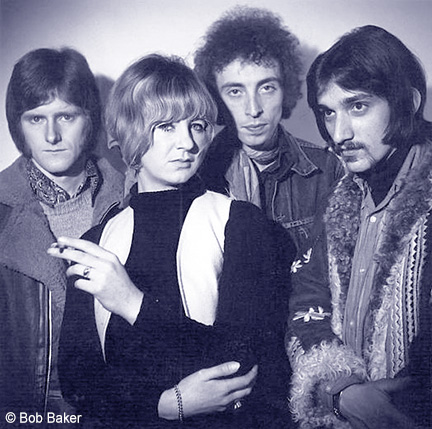
STOURBRIDGE
Updated January 2023
Stan Webb guitar, vocal
Andy Silvester bass guitar (left in 1971)
Alan Morley drums (left in 1968)
Christine Perfect (McVie) vocal, piano (left in 1969)
Dave Bidwell drums (joined in 1968)
Paul Raymond piano, organ (joined in 1969)
John Glassock bass guitar (joined in 1970)
Paul Hancox drums (joined in 1970)
Chicken Shack evolved from a Stourbridge based band called "Sounds Of Blue" who were performing in the West Midlands area by 1964. Early members included lead guitarist/vocalist Stan Webb, vocalist/pianist Christine Perfect, bass guitarist Andy Silvester, and saxophonist Chris Wood. The group made their name during the "British blues revival" of the late 1960s.
Christine Perfect went on to marry John McVie of Peter Green's Fleetwood Mac. She joined the group before they found world-wide fame as one of the most successful bands of the 1970s.
"I started hearing all the blues stuff at this record shop called The Diskery"

Talented guitarist Stan Webb is regarded by many as one of the great un-sung heroes of British blues music. He was born in Fulham, London on February 3, 1946 and moved to Kidderminster with his parents after leaving school. He started playing guitar during the "skiffle" craze of the late 1950s and formed his first group in 1962 called "The Strangers Dance Band" with whom he played instrumental versions of the hits of the day at pubs and youth clubs.
Stan Webb began to earn money in his first professional band called "Shades Five". Like many local groups at the time, they found regular bookings on Joe and Mary Regan's famous West Midlands circuit of venues. He recalled in an interview; "Shades Five was my first crack at being a professional musician working for Mrs Regan in Birmingham doing the Old Hill Plaza, the Plaza in Handsworth, and The Brumbeat Cavern. If you didn't do those, you weren't anyone!"
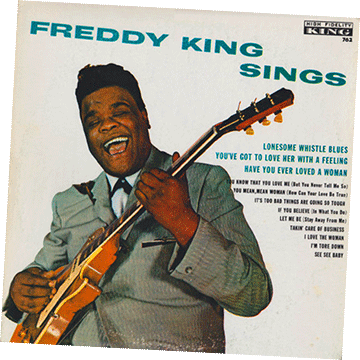
A record shop in Birmingham on Hurst Street changed Stan's outlook on music. He recalled; "I started hearing all the blues stuff at this record shop called 'The Diskery' that was wonderful. Went up there on a Saturday, they had all these American records playing, covers all over the ceiling. And that's when I first got 'Freddie King Sings'. I took it home and listened and thought, I don't believe this!"
It was local blues singer David Yeates who convinced Stan Webb to join his group called "The Sounds Of Blue". By this time, Webb was heavily influenced by American blues and R&B music. The Sounds of Blue line-up included Andy Silvester on rhythm guitar and saxophonist Chris Wood who lived in nearby Cradley Heath.
Chris Wood had attended Stourbridge Art College in 1963 and learned to play the flute before later graduating to saxophone. By March 1964, he was performing with Sounds Of Blue although he left the following year before they went over to Germany as Chicken Shack. Chris Wood then joined Jim Simpson's jazz influenced band called "The Kansas City Seven" (see Locomotive) and later became a founding member of the highly acclaimed and internationally successful Traffic.

Stan Webb recalled; "We did some of the Shades Five circuit, but the main thing was this one gig on a Sunday at Dudley Liberal Club, every Sunday for a year and it was absolutely packed. On bass and harmonica sometimes was Christine Perfect, and Andy Silvester played rhythm guitar. Then Phil Lawless took over on bass and Christine switched to piano, Chris Wood played sax."
"That was the beginning of my absolute love for the blues"
Piano player and vocalist Christine Anne Perfect was born born July 12, 1943 in Bouth, Lancashire and grew up in Bearwood, Birmingham. Her father Cyril Percy Absell Perfect, was a concert violinist and lectured at St. Peters College of Education in Saltley, Birmingham while her mother Beatrice was a professional psychic and faith healer!
Coming from a musical family, Christine learned to sing and play piano at an early age. With an eye on becoming a teacher, Christine later attended Moseley College of Art where she played piano in a skiffle group called "The Bobcats". Their guitarist was Chuck Botfield who went on to form The Rockin' Berries.
After her graduation from art college, Christine Perfect played in a vocal duo with Birmingham University graduate Spencer Davis and they became regulars on the Birmingham folk and blues circuit, busking and often appearing at the Golden Eagle pub on Hill Street (see The Spencer Davis Group).
Andy Silvester who was a friend from art college asked Christine to join the Sounds of Blue line-up. Christine said; "I didn't have a clue as to what to do on piano. Stan bought me a Freddie King album and that was the beginning of my absolute love for the blues".
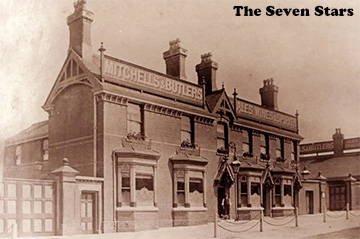
The Seven Stars pub in Stourbridge hosted blues nights with Sounds of Blue becoming regular performers. One of their fans was a young wanna-be blues singer and harmonica player named Robert Plant. He would sometimes persuade the older musicians there to let him go on stage and sing a few blues songs with them. Robert of course years later went on to world-wide fame as vocalist in the acclaimed rock group Led Zeppelin.
Sounds of Blue eventually disbanded with the various members going their seperate ways. Andy Silvester and Stan Webb decided to form a new blues-based group with drummer Alan Morley and selected the name "Chicken Shack" in reference to an old blues expression meaning "road house".
Meanwhile, Christine Perfect headed down to London where she worked for several months in the West End as a window dresser. Andy Silvester remained in contact and kept writing persistently asking her to join the new Chicken Shack line-up. Finally, she agreed and took a train back to Birmingham.
"We were the only band doing the sort of stuff we were doing"
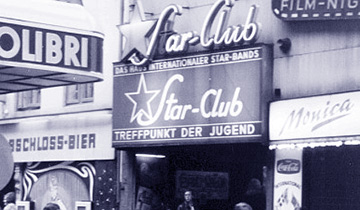
In April 1967 the group headed over to Germany for an extended engagement at Hamburg's famous Star Club. Many British acts, including The Beatles, had got their start performing in the Hamburg clubs resulting in some bands attracting a large German following. This was certainly the case with Chicken Shack who stayed for an extended period and remain popular in that country to this day.
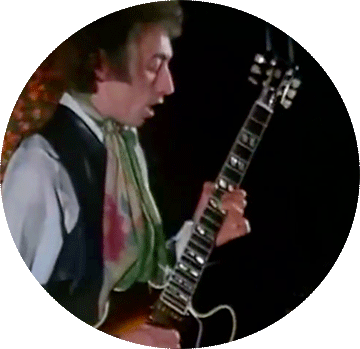
Stan Webb recalled; "We did about a six week stint at the Star Club in Hamburg. That was brilliant, some of the best times I've ever had. Tony Ashton and Ritchie Blackmore were there and we all used to meet up at Kurt's Beer Shop. We were the only band doing the sort of stuff we were doing. The Star Club at that time wasn't getting many people in. Inside a week we started packing them in and they were so pleased with what was happening they put the money up and cut the hours. We couldn't do any wrong."
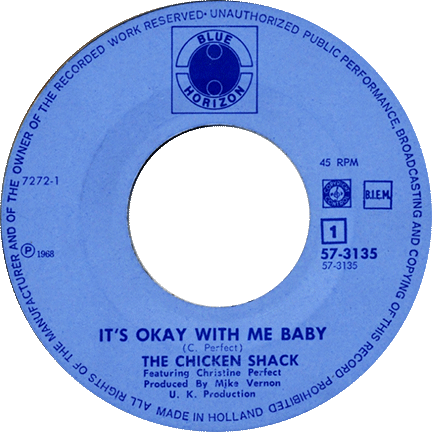
Alan Morley left in 1968 and there were various drummers in the line-up during this period before Dave Bidwell from London joined them. The combination of Stan Webb's bluesy guitar virtuoso and Christine Perfect's emotionally charged vocal gained Chicken Shack many followers. They soon caught the attention of London producer Mike Vernon who operated his own Blue Horizon record label. Vernon signed the group to a recording contract.
Chicken Shack had toured the U.K. during 1967 which included performing at the Windsor National Jazz & Blues Festival along with label-mates Fleetwood Mac whose bass guitarist John McVie struck up a friendship with Christine Perfect. The pair kept in touch after the tour and a long-distance relationship developed.
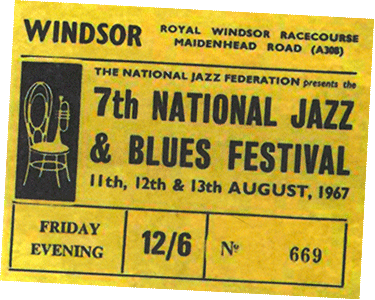
The first Chicken Shack single issued at the end of 1967 in the UK was a song called 'It's Ok With Me Baby' featuring Christine Perfect - possibly her first recorded composition. This record - far bluesier than most heard on the radio that year - featured jazzy horns along with Christine's vocal and piano.
The first Chicken Shack album entitled "Forty Blue Fingers Freshly Packed And Ready To Serve" was released to critical acclaim in 1968. In September 1968, Chicken Shack performed for the first of several times at the influential "Mothers" club (formerly the Carlton Ballroom) in Birmingham.
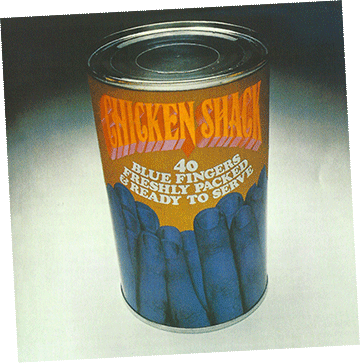
During the next year, Chicken Shack recorded a few singles and a second big selling album entitled "OK Ken?" but it was not until the release of the Etta James cover 'I'd Rather Go Blind' in May 1969 that the band had their first chart success, making it into the top twenty. The record featured a lead vocal by Christine Perfect and won the group many admirers.
By this time, Fleetwood Mac had experienced considerable success in the record charts and were attracting an ever-growing international audience. After they returned from an American tour, John McVie proposed to Christine and she accepted after deciding to leave Chicken Shack to become a housewife. Ironically she had just been voted best female vocalist for 1969 by the NME reader's poll, but fortunately her "retirement" from music did not last for long.
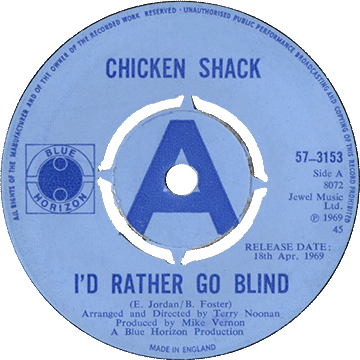
"The business side of Chicken Shack was a total and absolute disaster"
Paul Raymond from the group Plastic Penny was chosen as Christine Perfect's replacement with another Chicken Shack single 'Tears In The Wind' making the charts in September 1969. However, the next few Chicken Shack albums met with less interest and in 1970 Stan Webb had a falling-out with Mike Vernon resulting in the group being dropped by their record label.
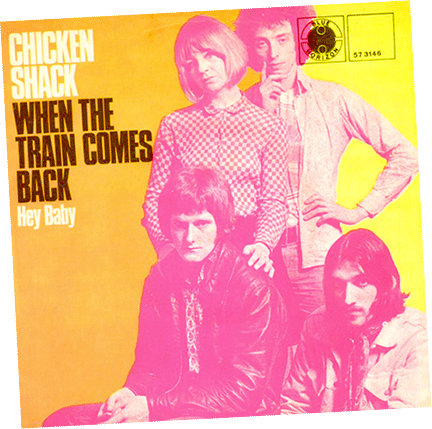
Stan Webb said; "Right from the start, the business side of Chicken Shack was a total and absolute disaster. We were being managed by somebody who had another band as well. We were earning a lot of money but the other band wasn't and some of our money was used to finance that other band. But I could never work out why the manager was living in a six bedroom flat in Belsize Park and I wasn't."
There were also disagreements within the band leading to the departure of Dave Bidwell and Paul Raymond who then joined the famous UK blues outfit "Savoy Brown" led by guitarist Kim Simmonds who were at that time starting to have some success in North America. Their vocalist Dave Walker had previously fronted a number of West Midlands bands. A few years later, Stan Webb was to also perform with Savoy Brown for a short time.
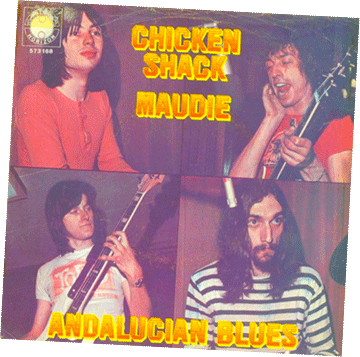
Undaunted, Stan Webb continued with a new Chicken Shack line-up to include bass guitarist John Glassock from the famous "Jethro Tull" and Paul Hancox on drums. The group went on a major tour of the USA for seven weeks along with with the acclaimed hard rock band "Deep Purple" as headliners, but a promised new album deal for Chicken Shack failed to materialize.
The 1970s saw other musicians join and leave the Chicken Shack line-up including Hughie Flint (co-founder of McGuinness Flint), Paul Hancox (previously of Wayne Fontana and The Mindbenders), Chris Mercer, Tony Ashton, and Bob Daisley who went on to work with Richie Blackmore and Ozzy Osbourne.
By the end of 1973 following an acrimonious German tour and poor sales of their latest LP, Chicken Shack disbanded at which point Stan Webb formed a new line-up called "Broken Glass" with whom he recorded an album for Capitol Records in 1975. Stan later revived Chicken Shack for a short time with new members Robbie Blunt and Paul Martinez who both went on to play with Robert Plant following the demise of Led Zeppelin.
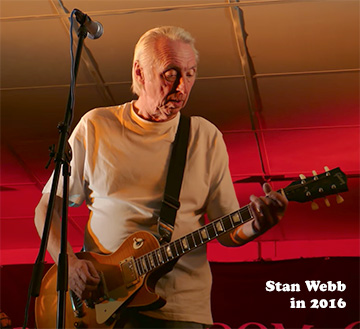
By the 1980s, Stan Webb had tired of the music business so took time off to do other things. Since then, Chicken Shack's 1960's recorded legacy has attracted the interest of many British blues fans.
Christine Perfect (now known as Christine McVie) went on to become a pivotal member of her husband's group Fleetwood Mac in 1970 when she joined after the departure of their brilliant guitarist and founding member Peter Green. That band with the line-up of Mick Fleetwood (drums), John McVie (bass guitar), Christine McVie (vocal/keyboards), Lindsey Buckingham (vocal/guitar), and Stevie Nicks (vocal), achieved massive and worldwide success during the 1970's, particularly in the U.S.A. where they gained a huge following.
After decades of performing, recording and touring with Fleetwood Mac, Christine McVie retired from the group in 1998 but re-joined in 2014 and the "classic" line-up toured for a final time. Christine McVie passed away on November 30, 2022 at age 79. Her incredible songwriting and vocal contributions to the group will never be forgotten (see Christine McVie Tribute on BrumBeat).
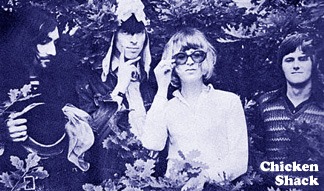
Stan Webb remains a much respected guitarist whose contribution to early British blues music continues to gain recognition. He still occasionally performs today as a solo act and also sometimes with various new line-ups of Chicken Shack.
Copyright © John R Woodhouse
Sources: 'The Guinness Book of British Hit Singles' 5th edition 1985; 'The Virgin Encyclopedia of Sixties Music' by Colin Larkin 1997; 'The Rolling Stone Encyclopedia of Rock & Roll' third edition 2001; 'Fleetwood Mac The Definitive History' by Mike Evans 2011; Some selected quotes are from 'Stan Webb: What Can A Poor Boy Do?' by Harry Shapiro, Blue Print 2001.
Chicken Shack 1960s Record Releases
(highest UK chart position in brackets)
Singles:
Albums: